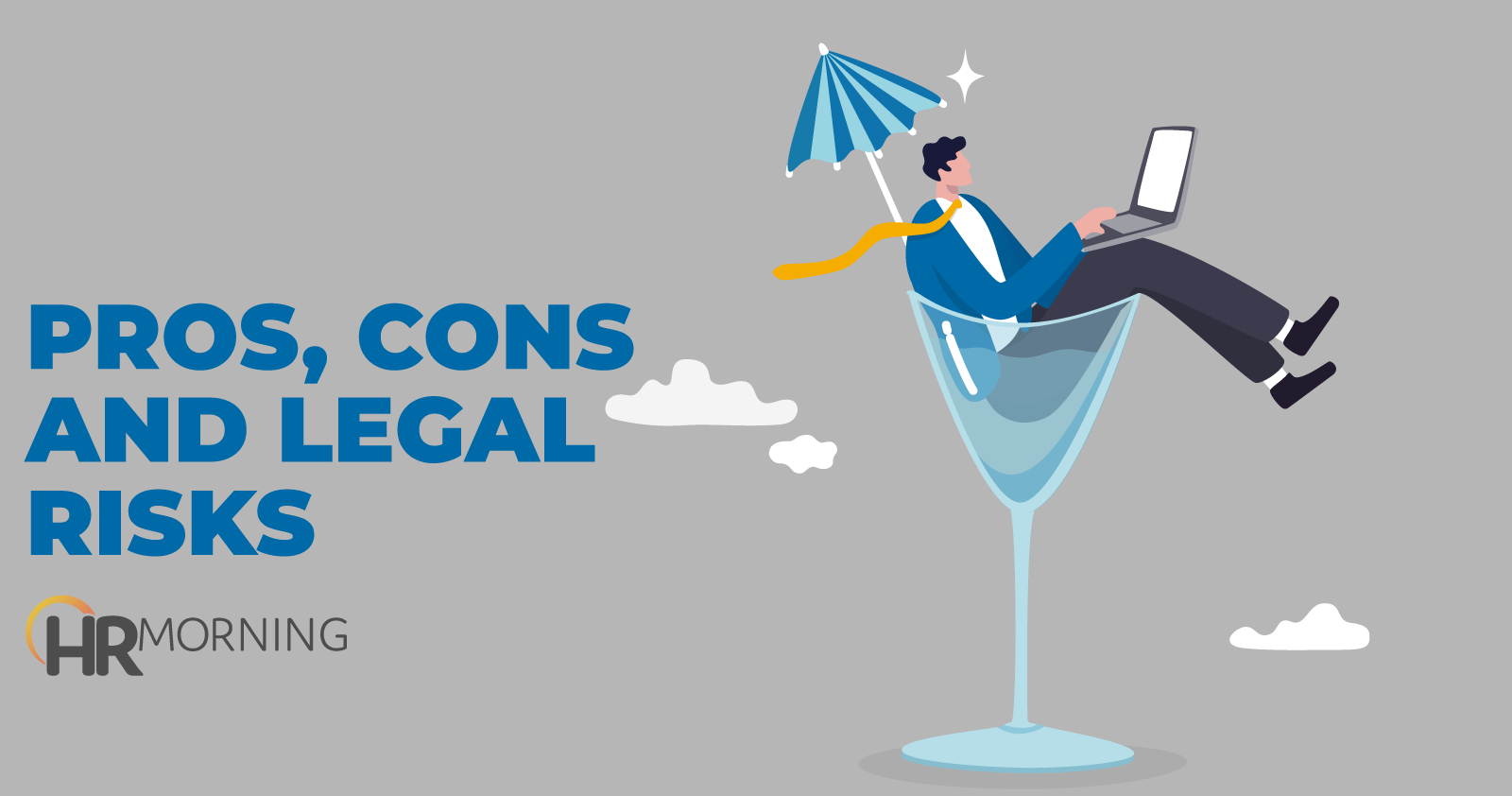With return to the workplace plans well underway, some employers are adding extra perks to make the office as appealing as possible for fans of remote work.
Companies have added things like schedule flexibility, new health benefits, casual dress codes — and even are allowing workers to bring pets into the office.
But another one of those new perks, according to the Wall Street Journal, is allowing alcohol at work.
Employers embracing booze
While not an entirely new concept, alcohol at work has been growing in popularity lately. Here are a few companies that encourage drinking:
- Yelp – Employees can help themselves to beer as long as they track their drinks through an app, which logs how much they drink and when.
- Trello – It’s not uncommon for workers to celebrate big achievements with a glass of champagne or a shot of whiskey.
- Twitter – Employees can help themselves to wine and beer from the company fridge.
- Crowdflower – Beer is available as a perk for employees who need to work late.
- J. Walter Thompson – The office has a full-service bar where employees can grab a drink on or off the clock.
While drinking on the clock could certainly attract younger employees as well as increase team bonding, there are lots of things to consider before allowing alcohol in the workplace.
Pros and cons
To help employers evaluate whether alcohol could be a potential fit for their workplaces, Clarity Way, an addiction and mental health recovery center in south central Pennsylvania, has put together a list of pros and cons.
Here are the pros:
- It may improve creative problem solving. One study found that slightly intoxicated people solved problems more creatively and more quickly than completely sober people. (It’s important to note that the same people performed more poorly on memory-related tasks).
- There are health benefits associated with moderate drinking. Research has shown that moderate alcohol consumption can improve good cholesterol, lower risk of heart disease, prevent the common cold and reduce the risk of diabetes. (It’s important to note that these benefits don’t happen to everyone).
- It may incentivize employee performance. Light drinking on the job could help employees feel appreciated and more loyal to the company, resulting in a higher performance and productivity level.
- It could help employees connect. Making alcohol available can result in more socialization, bringing employees in different departments together and strengthening those professional relationships.
- It could attract new talent. Having alcohol at work as a perk of the job could be a unique perk that some talent would really like to have.
Of course, along with the positives come the downsides of alcohol at work. Here are some cons:
- Could cause problems with alcohol for employees. Workers who get into the habit of having a drink most days at work could be on the path toward alcohol addiction.
- It would exclude those who don’t drink. People who don’t drink alcohol for personal reasons will feel excluded from this perk. It also could lead to peer pressure situations or uncomfortable conversations about why someone isn’t drinking.
- It could compromise the sobriety of recovering alcoholics. Making alcohol readily available at work can make it extremely hard for those with an alcohol addiction to stay sober.
- You’d be responsible for legal mishaps. Employers may be liable if an employee were to get injured or into a car accident after drinking on the job.
- It could increase the occurrence of sexual harassment. A study conducted by Cornell University found that the chances of sexual harassment occurring double with every alcoholic drink consumed.
Policies to consider
The inherent legal risks of alcohol at work shouldn’t be overlooked, says employment law attorney Jon Hyman.
Hyman mentioned concerns about a lot of the issues listed above, such as sexual harassment and the effect on recovering alcoholics. He also discussed some policy-related things to take into account:
- Decide when the bar will be open. All day? Just after lunch? After hours? Think about the logistics of an employee having a beer on their lunch break, then coming back to finish up their work.
- Check your insurance policies for alcohol-related incidents. If your policies don’t mention booze, it’s wise to get that adjusted or reconsider alcohol at work altogether.
- Who’s pouring the drinks? Is there a trained bartender, or are people making their own drinks? If it’s all up to the employees, this is a recipe for overdoing it.
- Who’s monitoring employees’ sobriety? Make sure you have someone in charge of ensuring workers aren’t having too much to drink.
- Think about how employees are getting home. What happens when someone is over the legal limit? How are they getting home? Will you use designated drivers or call an Uber for them? Will employees have to take a breath test in order to get their keys back? Make sure you have policies on this.


